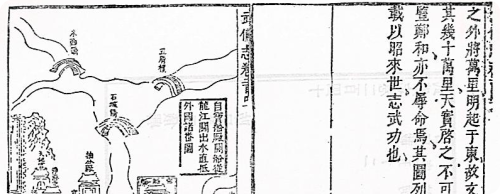 |
| Zheng He’s map (via Wikipedia) |
Read Part 1
Turning Inward
After the death of Zhu Di, China turned against naval expeditions for which there are many reasons.
The simplest is that the Confucians prevailed. The imperial bureaucracy sought to contain the expansionary ambitions of its sailors and the increasing power of its merchant class: Confucian ideology venerates authority and agrarian ways, not innovation and trade. “Barbarian” nations were thought to offer little of value to China. [The Asian Voyage: In the Wake of the Admiral]
Confucius thought that foreign travel interfered with family obligations. In Analects he said “While his parents are alive, the son may not go abroad to a distance. If he does go abroad, he must have a fixed place to which he goes.” Since this was the moral code for the upper class, government service and farming were considered noble professions
Other factors contributed: the renovation of the north-south Grand Canal, for one, facilitated grain transportand other internal commerce in gentle inland waters, obviating the need for an ocean route. And the tax burden of maintaining a big fleet was severe. But the decision to scuttle the great ships was in large part political. With the death of Yongle, the Emperor who sent Zheng He on his voyages, the conservatives began their ascendancy. China suspended naval expeditions. By century’s end, construction of any ship with more than two masts was deemed a capital offense. [The Asian Voyage: In the Wake of the Admiral
Then things took a turn for the worse. The ships were let to rot in the port and the logs books and maps were destroyed. A major attempt at erasing history was done. Then as they say, life finds a way.
Unlike Agathocles, whose memory survived only through coins, Zheg He’s traces were scattered around for it to be erased quickly. In some countries he was worshipped as a god. The chronicles of Zheng He’s translators Ma Huan (Overall Survey of the Western Shores) and Fei Hsin (Overall Survey of the Star Fleet) survived. So did a few imperial decrees and some maps. Zheng He died in the seventh voyage and was probably buried at sea; his tomb contains his clothes.
Though Zheng He’s voyages were meant to be a peaceful projection of power, they often interfered in local politics and projected force. A Chinese pirate Chen Zuyi who was active in the Sumatra was captured in a battle in the Straits of Malaca and taken to Nanjing and executed. Michael Yamashita mentions that the Chinese put a new king – Manavikarma – on the throne of Calicut. The Sri Lankan king Alakeswara refused to be a tributary to the Chinese; he was captured and taken in chains to Zheng He’s boss.
If the Chinese were a naval power during the ascent of the European powers, the Arabian Sea and Indian Ocean would have seen a different geo-political equilibrium.
References: This article was motivated by the lecture on China by Prof. Matthew Herbst in MMW4 series. By then Maddy had posted his well researched article on Zheng He (Cheng Ho) in Calicut. Michael Yamashita got paid to travel along his path for a year resulting in the book Zheng He (Discovery) which has amazing photographs. I did not read Gavin Menzies’ book, but picked the PBS documentary 1421: The Year China Discovered America (PBS)?
based on it. When China Ruled the Seas devotes few pages to what they did in Calicut. Maddy also has a comprehensive article covering the Chinese trade in Calicut.
Postscript: A British submarine commander, Gavin Menzies, in a best selling book 1421: The Year China Discovered America argued that Zheng He’s fleet reached America in 1421. A PBS documentary by the same name put Gavin Menzies on camera and contradicted most of his assumptions. Mr. Menzies agreed with the producers that most of his evidence is flimsy, but he still stood by his theory.
Do you have any more details on Chinese putting a new king in Calicut? Thanks.
( BTW is it Manavikarma or Manavikrama? – as I understand “Manavikraman Raja” is a common name in that kind of kOvilakams ).
Let me try & answer that question – Unfortunately no further specific information is available though it is conceivable that Zheng He lent military support to the Zamorin’s wars with his neighbors.
However by that time, it was a natural succession process in the Zamorin dynasty and support as such would not have been needed other than presence of foriegn envoys at the so called ‘ariyittu vazcha’ or ‘Mamankam’. The Zamorin was not unduly threatened even in 1402-1410 period, thus he did not need help. But they always looked forward to additional support in enlarging their territory through territorial wars.
Three titular names are used by the Zamorin’s of Calicut. Given names were dropped and one of these three names are adopted at the time of becoming a Samoothiripaad.
Mana Vikrama
Mana Veda
Viraraya (rarely)
Had the chinese got the strong naval forces the geo political boundry of china would have been extended till arabian sea.
Thank you very much, maddy!
thank you very much, to published Chinese Power in Indian Ocean